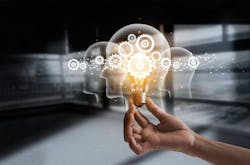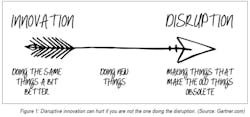My mind is a kaleidoscope of future peeks into our Disruptions previewed at the 2019 AHR Expo in Atlanta.
This online interview, ControlTalk NOW — Smart Buildings Videocast and PodCast for the week ending Feb 3, 2019, features me, Ken Sinclair, in a conversation with Alper Üzmezler, CEO of BASSG and Alta Labs. In it I talk about how to navigate our perilous journey on the “Path of Least Disruption.”
I am always looking for the easiest way to explain what is going on. This simple diagram shows where our focus was, but now where it needs to be.
Last year we saw innovation and our entry into doing new things. We were growing, finally. This year the talk of disruption was everywhere. As an industry that will survive we need to be the people Doing the Disruption, not the ones just watching and waiting to be Disrupted.
What are some examples of disruptions coming to our Automated Building Industry?
Imagine a building in the middle of a blackout and a car driving up with a V2G battery ready to charge the whole building within hours? That is a disruption reaching smart buildings very soon; EVs helping utilities with that level of demand response.
Demand response programs are also becoming more prevalent, and more complex. As an example, citied in this article, Utility Rates and Tariffs, Southern California Edison’s
Critical Peak Pricing demand response program imposes an extremely high surcharge from 2 to 6 PM twelve times a year on the highest system use days.
In SCE’s TOU-GS-3 schedule, the additional charge per kWh is $1.37453 for all consumption during the Critical Peak event.
Once the “charges” that make up a tariff rate are defined, the next step is to assign the tariff to the meters that measure energy use. The Tariff Engine then calculates energy costs based on the charges and actual energy consumption data. Analytics rules and algorithms can then use those detailed cost calculations to calculate the cost associated with issues it detects in the operation of equipment systems. The result is a precise calculation of costs associated with the use, and misuse, of energy resources.
Anto Budiardjo, Editor, New Deal for Buildings, writing in an article, Disruption, Why it’s Important, says the best advice is to keep your eyes and ears open for impending disruption in BAS:
There are three kinds of people when it comes to change: those who resist it, those who accept it, and those who make it happen. In this brief article, I’ll share my views on how these different types of people should look at disruption.
Gary Polakovic, writing on How to improve communication between people and smart buildings for the University of Southern California says that,
USC researchers found people connect better with a computer-generated avatar that represents building management — and small talk helped, too.
On the flip side of the coin, Scott Chchrane, President and CEO Cochrane Supply & Engineering asks the burning question, Why Are Big Buildings So Dumb?
Most big buildings I walk into are currently dumb. They leave the lights on all the time, they don’t care who I am or what I am doing there, and they don’t change the temperature until it becomes uncomfortable and I complain. So why do we call them smart buildings when they are so stupid?
We are definitely in the days of disruption, for a future peek at coming disruption take a look at this Videocast and PodCast with author and Future Technologist, Sudha Jamthe, from Silicon Valley, who explains business model creation along the yellow-bricked-digital-transformational-highway.
Sudha Jamthe is the CEO of IoTDisruptions.com and a globally recognized Technology Futurist with 20+ year mix of entrepreneurial, academic and operational growth experience from eBay, PayPal, GTE, and Harcourt.
This is a fun peek from the past into our future disruptions dating back to November of 2016. In it, Jamthe decides she’s had enough of talking to people about intelligent machines, and decides instead, Starting today I am going to interview intelligent machines directly.
The resulting interview with Alex, Amazon Echo and Google Home reveals a focus based around the consumer brand.
The buzz of AHRExpo never completely happens just on the exhibit floor or at the education sessions but in the moments between in the minds of never before networked folks in the huddles in booths, halls, buses, Uber, Lyft, taxis, bars, and hotel rooms. Everywhere were meaningful discussions of "Doing Disruption" before we are Disrupted.
Disruption is everywhere yet at our core we still use pneumatics, Ethernet, BACnet, Niagara Framework. We are at a disruption point that is equal to what DDC did to pneumatics, What internet did to DDC. IoT is disrupting us. Disruption is making things that make the old things obsolete. Except our "things" -- buildings -- cannot be made obsolete completely (at least not yet) so we need to build elegant mindful bridges between disruption, innovation, and reality. As scary as this thought is, this is just the dawn of what we will see in the following days of disruptions.
This last section captures some of the disruptions from the AHR Expo event and my ramblings that are dawning on our new digital transformation horizon.
First, my two columns for the Connected Contractor leading up to AHR, The Open Road Is Bumpy, Edgy, but Mindful and “Open”ing Mindful Building Emotions. (This second column I can recommend for its links to amazing resources in powerpoints, YouTube, podcasts and URLs.)
How did we get on the road to disruption? Notes from the 7th Annual Connection Community Collaborator is session coverage from CONTRACTOR’s Editorial Director Steve Spaulding. An all-star lineup from the building automation community gathered at AHR Expo to share what interests and excites them this year.
While doing disruption we have an amazing opportunity to create well spent digital experiences. Building Emotion a term that I have coined is a whimsical name for the social fabric that is draped over and interweaving through every part of each building, designed to unlock value and opportunities for our occupants.
My younger mentors self-propelled session at AHR, Next Generation HVAC Controls: Open Hardware – Open Software overfilled the room (Video capture here) opening everything, mostly our minds.
Staring into the kaleidoscope of disruption at this event convinced me that action was required. We need to hear more from these young voices who are doing disruption, and I needed to sign up all these younger minds and share their thoughts with you as our newest young contributing editors.
With the capture from AHR Expo and my young gun contributing editors sharing their thoughts, we will start the dawn of disruption.
Please meet AutomatedBuildings.com's Young Contributing Editors.
To help you grow younger, I recommend that you look closely at the young folks around you. Help them to gather their thoughts and share them in a meaningful way with you and the industry at large. Our future depends on it.
I shared question in a recent question in this tweet;
How do we address our industry gender imbalance as we humanize the digitalization of our industry while mindfully building emotion? This imbalance is a great opportunity to involve new minds that well understand emotion and user experience UX.
No young people around you? Now that is a problem in today's rapid digital transformations.
My presenting partner Lawrence Ampofo, Ph.D. Enterprise Social Media, Humane Technology, Digital Wellbeing wrote this:
I'm unable to attend the @ahrexpo today in person, unfortunately, but thankfully my talk is being delivered by @ken_sinclair. Listen to this episode where we distill my talk to its key points… I hope my desire and excitement about including digital mindfulness as part of our disruption is heard. I admit it is a leap, but if you roll back your eyes and imagine what you think digital mindfulness might mean and how we could use it as a tool building emotion while doing disruption, think you can imagine a better outcome.
(You can listen to his podcast on the subject here: Building Emotion at the AHR Expo)
This website, ethicsinaction.ieee.org defines better the components of Building Emotion and is a very good resource for our journey to Socially Acceptable Autonomous Buildings.
The IEEE Global Initiative on Ethics of Autonomous and Intelligent Systems) is launching the second version of Ethically Aligned Design: A Vision for Prioritizing Human Well-being with Autonomous and Intelligent Systems, (EADv2) the most comprehensive, crowd-sourced global treatise regarding the Ethics of Autonomous and Intelligent Systems available today.
The Enhanced Occupant Experience – Taking Buildings to the Next Level! By Howard Berger, Managing Partner, Program Director, Realcomm explains the workspace our holy grail of achievement is also in the state of disruption:
The earliest efforts to give occupants control fed into data streams about their usage and needs. Many of these applications tie into location and traffic analysis, people counting and people analytics. It includes information about their work habits, preferences and behaviors. While some see this data as a potential revenue stream, there must be a strong privacy policy around the data: how it can and can't be used. Some sensors may be getting into gray areas as far as what is personal or not. If you can analyze or predict the mood of the room, how will that tie into the ways we control for 'happiness'? As AI and Machine Learning become more predictive, there is great potential to be incredibly helpful, but also potentially invasive.
In essence, the way a building interacts with you in an inspiring, engaging way creates a feeling of ease, kinship and belonging. Responsiveness and anticipation of needs will be a given. Valuable time is freed up from mundane tasks like monitoring and managing meeting room bookings, and instead used to creatively engage with peers and for strategy planning for the business. The physical building or campus becomes the immersive digital workplace, a healthier, more profitable place for the humans who work there.
The fundamentals on digital transformation and evolution, including workplace experience, and other industry top of mind topics, will be discussed at Realcomm - IBcon 2019. The conferences will be held in Nashville, TN on June 13 & 14.
And more events are coming to open our future mindfully while Building Emotion creating our discussion of our disruptions
CONTROLS-CON will take place May 2nd and 3rd, 2019 at the MotorCity Casino Hotel in Detroit, Michigan. This fast-paced, education-packed event will bring together hundreds of integrators and end users from throughout the United States and Canada to explore the latest technologies and possibilities of Building Controls and the Internet of Things (IoT) in commercial and industrial buildings.
Haystack Connect 2019 is organized and produced by the Project Haystack Organization—an open source community of people and companies who share the vision that a connected, collaborative community can move the industry forward in ways that no single supplier can! The event builds on the inspiration and mission of the community to address the challenges of making smart device data work seamlessly across applications of all types.
The work of Building Emotions in our Days of Disruption has only just begun. Daily disruption will become the norm and those that will succeed will be the ones who disrupt the disruption.
About the Author
Ken Sinclair
Editor/Owner/Founder
Ken Sinclair has been called an oracle of the digital age. He sees himself more as a storyteller and hopes the stories he tells will be a catalyst for the IoT future we are all (eventually) going to live. The more than 50 chapters in that ongoing story of digital transformation below are peppered with HTML links to articles containing an amazing and diverse amount of information.
Ken believes that systems will be smarter, self-learning, edgy, innovative, and sophisticated, and to create, manage and re-invent those systems the industry needs to grow our most important resource, our younger people, by reaching out to them with messages about how vibrant, vital and rewarding working in this industry can be.

